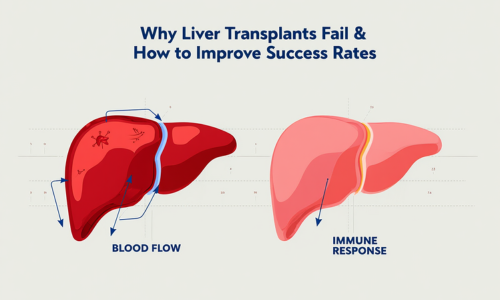Liver transplants are life-saving procedures for patients with severe liver disease, but they are complex and carry significant risks. Understanding why liver transplants fail and taking preventive steps can greatly improve outcomes. This guide explores the main causes of transplant failure, strategies to minimize risks, and post-operative care recommendations for better long-term success.
1. Common Reasons Liver Transplants Fail
a) Organ Rejection
One of the most frequent causes of transplant failure is organ rejection, where the body’s immune system attacks the new liver.
-
Prevention: Lifelong immunosuppressive therapy, regular blood tests, and strict adherence to prescribed medication schedules.
b) Surgical Complications
Problems during or after surgery, such as excessive bleeding, bile duct issues, or vascular complications, can impact the success of the transplant.
-
Prevention: Choosing an experienced surgical team and high-volume transplant centers significantly reduces these risks.
c) Pre-existing Medical Conditions
Chronic illnesses such as diabetes, heart disease, or kidney problems increase the likelihood of complications after surgery.
-
Prevention: Comprehensive pre-transplant evaluation and proper management of existing medical conditions.
d) Post-Transplant Infections
Patients are more vulnerable to infections due to immunosuppressive medications.
-
Prevention: Strict hygiene, recommended vaccinations, and early treatment of infections are essential.
e) Non-Adherence to Medication & Care Guidelines
Skipping medications, ignoring dietary restrictions, or neglecting follow-up appointments can jeopardize transplant outcomes.
-
Prevention: Patient education, counseling, and structured support for medication adherence and lifestyle management.
2. Factors That Influence Transplant Success
a) Donor and Recipient Match
Compatibility in blood type, liver size, and tissue type is crucial. Proper matching improves graft survival and reduces the risk of rejection.
b) Age and Overall Health
Younger, healthier patients often experience better outcomes, while older or frail patients may face higher risks.
c) Timing of the Transplant
Delays in receiving a transplant can worsen liver function and reduce chances of success. Early evaluation and listing increase survival rates.
3. Post-Transplant Care to Improve Outcomes
Proper care after surgery is critical to prevent complications and maintain liver function.
-
Medication Compliance: Strict adherence to immunosuppressants prevents rejection.
-
Regular Follow-ups: Routine lab tests and imaging detect complications early.
-
Healthy Lifestyle: Balanced nutrition, avoiding alcohol, and moderate exercise support recovery.
-
Monitoring for Complications: Prompt recognition and treatment of infections, bile duct problems, or graft dysfunction is vital.
4. Accessibility and Support Considerations
-
High-Quality Care Centers: Hospitals with high transplant volumes and experienced teams generally report better outcomes.
-
Remote Follow-ups: Telemedicine can help patients in distant locations maintain post-transplant care.
-
Support Networks: Engaging with patient groups or caregiver networks improves adherence and emotional well-being.
5. Lifestyle & Long-Term Strategies
-
Nutrition: High-protein, nutrient-rich diets support liver health.
-
Exercise: Light to moderate activity helps maintain overall fitness.
-
Mental Health: Counseling or support groups reduce stress and improve adherence to care plans.
-
Patient Education: Understanding risks, warning signs, and medication schedules increases transplant survival.
Conclusion
Liver transplants are complex procedures, but understanding the causes of failure and following preventive strategies can significantly improve success rates. From pre-transplant evaluations to long-term lifestyle management, every step matters. With proper medical care, adherence to medication, and structured support, patients can achieve the best possible outcomes and enjoy an improved quality of life.
Frequently Asked Questions (FAQ)
1. What are the main reasons liver transplants fail?
Liver transplants can fail due to organ rejection, surgical complications, pre-existing medical conditions, post-transplant infections, and non-adherence to medication or lifestyle guidelines.
2. How can I prevent liver transplant failure?
Preventive measures include taking immunosuppressive medications as prescribed, attending regular follow-ups, choosing an experienced transplant center, maintaining a healthy lifestyle, and promptly addressing infections or complications.
3. How important is post-transplant care?
Post-transplant care is critical. Regular check-ups, lab tests, proper diet, medication compliance, and monitoring for complications significantly improve transplant success rates.
4. Does age affect liver transplant success?
Yes. Younger, healthier patients generally have better outcomes. However, careful pre-transplant evaluation and management of health conditions can improve success in older patients as well.
5. Can infections cause a liver transplant to fail?
Yes. Immunosuppressive medications increase susceptibility to infections, which can jeopardize liver function. Maintaining hygiene, vaccinations, and early treatment of infections are essential.
6. How do donor-recipient compatibility factors influence success?
Compatibility in blood type, liver size, and tissue type reduces the risk of organ rejection and improves graft survival. Proper matching is a key factor in transplant success.
7. Can lifestyle changes improve long-term transplant outcomes?
Absolutely. Balanced nutrition, moderate exercise, avoiding alcohol, managing stress, and adhering to medications all contribute to long-term transplant success.

